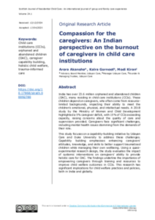India has over 23.6 million orphaned and abandoned children (OAC), many residing in child care institutions (CCIs). These children depend on caregivers, who often come from resource limited backgrounds, impacting their ability to meet the children’s emotional, physical, and intellectual needs. A 2018 study by the Ministry of Women and Child Development highlighted a 5% caregiver deficit, with 15% of CCIs exceeding capacity, raising concerns about the quality of care and supervision provided. Caregivers face significant challenges, including mental health issues stemming from the demands of their role. This study focuses on a capability-building initiative by Udayan Care and Duke University to address these challenges. Capability building emphasises enhancing caregivers’ attitudes, knowledge, and skills to better support traumatised children while managing their own wellbeing. Using a quasiexperimental research design, the study evaluates the impact of systemic interventions on caregivers' ability to provide holistic care for OAC. The findings underline the importance of empowering caregivers through training and resources to improve child welfare outcomes in CCIs. This research has significant implications for child welfare practices and policies, both in India and globally.

